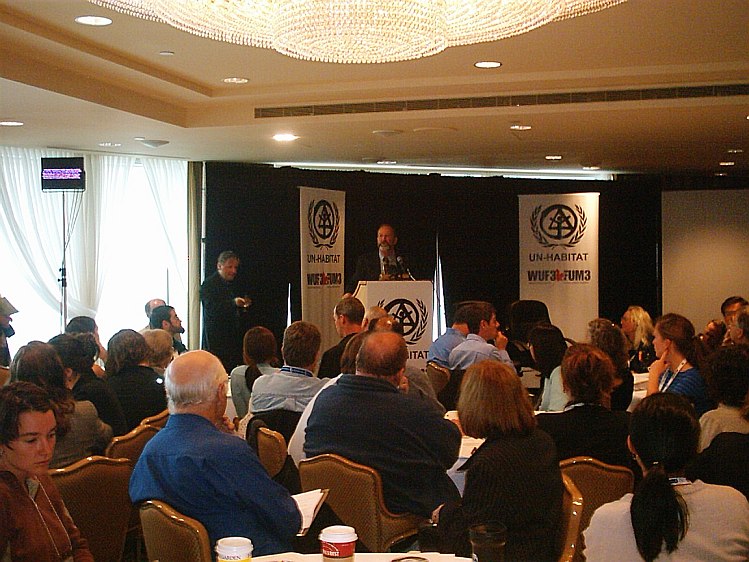A ‘New York’ Paper Takes a Look in the Mirror
Tag: glocalization

World Urban Forum 3 – Sustainable City or Sustainable Illusion?

VANCOUVER – 7:43 a.m. and it is standing room only at today’s first ’side event’ – ‘One small step for cities, one giant leap for the planet: Practical solutions for cities stepping towards a lighter footprint’
A quick headcount reveals one hundred people present plus media who’ve turned out to chill with ‘Dr. Doom’ otherwise known as ‘Dr. Content’. UBC Professor William Rees is founder of the Ecological Footprint approach. His powerpoint slides illustrate practical ways cities can reduce their consumption patterns. He sprinkles his talk with stories of progress –though not success– and the body language of the room confirms that on this single issue of sustainable production, we’ve all drunk the Kool Aid.
The bad news?
“Many of your children may be farmers…” says Professor Rees.
Torontonians need only look down the 401 to Motown. Detroit is the first major industrialized city in history reverting its hollowed-out urban centre back to active farmland. Oops. Suddenly, it ain’t our kids who are becoming farmers.
How did we get here? Rees reminds us that today’s consumer society is a social construct of the post-war advertising industry. Consequently, “Consumption [has become] a modern religion. Today’s ‘Throwaway Society’ would consider my mom’s habit of saving a glass jar and re-using that jar again and again just plain weird,” Rees muses.
Are there any examples of good sustainable cities? Rees is not aware of any.
The most ecological cities still have a rising GNP/GDP confirming that, “Globalization prevents us from creating sustainability.” The key problem though is surprisingly paradoxical, the real challenges include for example, convincing the Mayor of Lagos (Nigeria) that his city is consuming ‘too little’. The real challenge is to, “convince them of creating sustainable cities” out of cities comprised of slums. Our ‘Throwaway Society’ keeps them unconvinced.
(China’s cities are the true real problem. I may return to this question in a later spacing wire report.)
However, “micro-examples of sustainability” do exist. Turin, Italy has “micro-utilities” and “micro-technologies” to generate power for its residents rather than giant power plants.
Here in West End Vancouver, a high concentration of rental units translates into 133 housing units per hectare (Scarborough, North York and Etobicoke average 15 units), it is little wonder that 60% of West End residents are cyclists compared with 89% daily car use by residents of Vancouver’s Maple Ridge suburb. Oh yeah, the ‘D’ word again — Density. It is mandatory for sustainable smart growth.
Cuba experienced its own “mini-peak-oil” event after the collapse of the Soviet Union and Russian food imports stopped suddenly. Result being that today 70% – 80% of all leafy vegetables consumed in Havana are grown within the “urban hinterland”, ie within Havana’s city limits.
Rees likes my definition of ‘Glocalization’ which I raise during the Q&A. Glocalization is the city-state being replaced by the neighbourhood-civilization.
I ask Professor Rees if he can think of any micro-examples of reducing the ecological footprint at the neighbourhood level. Dr. Content doesn’t disappoint. “Yes, have you heard of the 100 Mile Diet?”. A collective of people in Vancouver have committed to consuming food which is only grown within a 100 mile radius of their neighbourhood and no more, thus reducing the ecological footprint of the food they eat from a global footprint to a local one. Instantly I think of Dufferin Grove Park’s Farmers’ Market and ask if he knows of any operating “‘100 Mile’ farmers’ markets?’” He hasn’t.
The Friends of Trinity-Bellwoods Park are currently looking into bringing a farmers’ market to their downtown park and are researching how to differentiate theirs from the nearby Dufferin Grove one on Thursdays. Hmmm….
After the side event ends, Dr. Rees and I continue the discussion as we walk through security checks heading towards a special lecture, ‘The Wealth of Cities: Towards an Assets-based Development of Urban Regions’.
The good news?
…Many of our children may be farmers.
HiMY SYeD World Urban Forum 3, Vancouver
